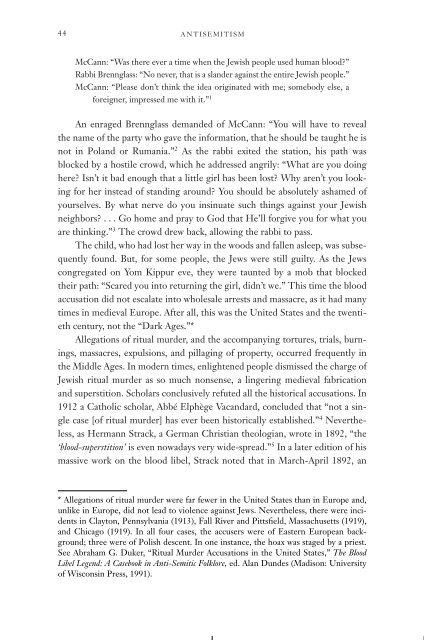41845358-Antisemitism
41845358-Antisemitism
41845358-Antisemitism
Create successful ePaper yourself
Turn your PDF publications into a flip-book with our unique Google optimized e-Paper software.
44 ANTISEMITISM<br />
McCann: “Was there ever a time when the Jewish people used human blood?”<br />
Rabbi Brennglass: “No never, that is a slander against the entire Jewish people.”<br />
McCann: “Please don’t think the idea originated with me; somebody else, a<br />
foreigner, impressed me with it.” 1<br />
An enraged Brennglass demanded of McCann: “You will have to reveal<br />
the name of the party who gave the information, that he should be taught he is<br />
not in Poland or Rumania.” 2 As the rabbi exited the station, his path was<br />
blocked by a hostile crowd, which he addressed angrily: “What are you doing<br />
here? Isn’t it bad enough that a little girl has been lost? Why aren’t you looking<br />
for her instead of standing around? You should be absolutely ashamed of<br />
yourselves. By what nerve do you insinuate such things against your Jewish<br />
neighbors? ... Go home and pray to God that He’ll forgive you for what you<br />
are thinking.” 3 The crowd drew back, allowing the rabbi to pass.<br />
The child, who had lost her way in the woods and fallen asleep, was subsequently<br />
found. But, for some people, the Jews were still guilty. As the Jews<br />
congregated on Yom Kippur eve, they were taunted by a mob that blocked<br />
their path: “Scared you into returning the girl, didn’t we.” This time the blood<br />
accusation did not escalate into wholesale arrests and massacre, as it had many<br />
times in medieval Europe. After all, this was the United States and the twentieth<br />
century, not the “Dark Ages.”*<br />
Allegations of ritual murder, and the accompanying tortures, trials, burnings,<br />
massacres, expulsions, and pillaging of property, occurred frequently in<br />
the Middle Ages. In modern times, enlightened people dismissed the charge of<br />
Jewish ritual murder as so much nonsense, a lingering medieval fabrication<br />
and superstition. Scholars conclusively refuted all the historical accusations. In<br />
1912 a Catholic scholar, Abbé Elphège Vacandard, concluded that “not a single<br />
case [of ritual murder] has ever been historically established.” 4 Nevertheless,<br />
as Hermann Strack, a German Christian theologian, wrote in 1892, “the<br />
‘blood-superstition’ is even nowadays very wide-spread.” 5 In a later edition of his<br />
massive work on the blood libel, Strack noted that in March-April 1892, an<br />
* Allegations of ritual murder were far fewer in the United States than in Europe and,<br />
unlike in Europe, did not lead to violence against Jews. Nevertheless, there were incidents<br />
in Clayton, Pennsylvania (1913), Fall River and Pittsfield, Massachusetts (1919),<br />
and Chicago (1919). In all four cases, the accusers were of Eastern European background;<br />
three were of Polish descent. In one instance, the hoax was staged by a priest.<br />
See Abraham G. Duker, “Ritual Murder Accusations in the United States,” The Blood<br />
Libel Legend: A Casebook in Anti-Semitic Folklore, ed. Alan Dundes (Madison: University<br />
of Wisconsin Press, 1991).


